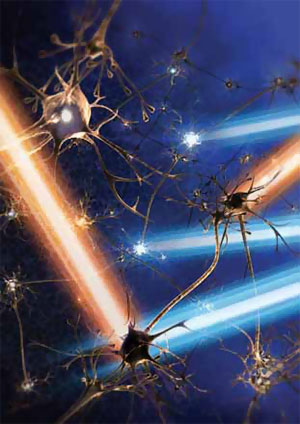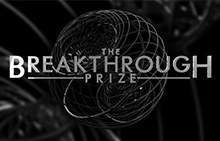Main Content
Breakthrough Prizes
Helen Hobbs on the thrill of discovering something new. Credit: Breakthrough Prize Foundation and National Geographic Channel.
The Breakthrough Prize Foundation announced that Howard Hughes Medical Institute (HHMI) investigators Karl Deisseroth of Stanford University and Helen Hobbs of the University of Texas Southwestern Medical Center are among five scientists awarded the Breakthrough Prizes in Life Sciences. The prizes honor transformative advances toward understanding living systems and extending human life.
The Breakthrough Prizes recognize pioneering work in physics and genetics, cosmology, and neurology and mathematics. Each prize carries an award of $3 million. The Breakthrough Prize in Life Sciences Symposium will be held at the University of California, Berkeley and begins at 10:30 a.m., PST, on November 9, 2015.

Optogenetic technologies use blue or yellow light to evoke or inhibit electrical activity in targeted neurons, represented in this artistic rendering by an intense glow. Credit: Feng Zhang and Karl Deisseroth.
“By challenging conventional thinking and expanding knowledge over the long term, scientists can solve the biggest problems of our time,” said Mark Zuckerberg, a founder of the Breakthrough Prize Foundation and Facebook. “The Breakthrough Prize honors achievements in science and math so we can encourage more pioneering research and celebrate scientists as the heroes they truly are.”
Deisseroth was honored for the development and implementation of optogenetics – the programming of neurons to express light-activated ion channels and pumps, so that their electrical activity can be controlled by light. Hobbs was recognized for the discovery of human genetic variants that alter the levels and distribution of cholesterol and other lipids, inspiring new approaches to the prevention of cardiovascular and liver disease.
In addition to Deisseroth and Hobbs, the winners of the 2016 Breakthrough Prize in Life Sciences are:
- Edward S. Boyden, Massachusetts Institute of Technology: for the development and implementation of optogenetics – the programming of neurons to express light-activated ion channels and pumps, so that their electrical activity can be controlled by light.
- John Hardy, University College London: for discovering mutations in the Amyloid Precursor Protein gene (APP) that cause early onset Alzheimer’s disease, linking accumulation of APP-derived beta-amyloid peptide to Alzheimer’s pathogenesis and inspiring new strategies for disease prevention.
- Svante Pääbo, Max Planck Institute for Evolutionary Anthropology: for pioneering the sequencing of ancient DNA and ancient genomes, thereby illuminating the origins of modern humans, our relationships to extinct relatives such as Neanderthals, and the evolution of human populations and traits.
Each received a $3 million award.
Prize recipients are invited to serve on the selection committee to select recipients of future prizes. Last year, HHMI investigator Jennifer A. Doudna of the University of California, Berkeley was awarded a Breakthrough Prize in Life Sciences. Winners are chosen by selection committees, comprised of prior Breakthrough Prize laureates.
Founded in 2013, the Breakthrough Prize Foundation is a not-for-profit corporation dedicated to advancing breakthrough research, celebrating scientists, and generating excitement about the pursuit of science as a career. The Foundation was founded by Sergey Brin and Anne Wojcicki, Mark Zuckerberg and Priscilla Chan, Jack Ma and Cathy Zhang, and Yuri and Julia Milner.
